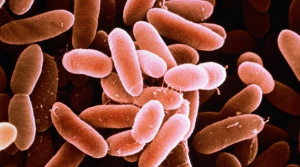Listeriosis in Pregnancy
 Listeriosis is a rare disease that causes mild or no maternal illness but can be devastating to the foetus in some cases leading to severe disease or even foetal death.
Listeriosis is a rare disease that causes mild or no maternal illness but can be devastating to the foetus in some cases leading to severe disease or even foetal death.
The bacteria organism that causes Listeria is a common and can be easily isolated from soil, dust, water, processed foods, raw meat, and the faeces of animals and humans. Faecal carriage of Listeria occurs in up to 15% of people. The incidence of women carrying Listeria in the vagina is lower.
Incidence
The incidence of the infection (not just carriage) Listeriosis in pregnancy is estimated to be 12 per 100,000, compared with a rate of 0.7 per 100,000 in the general population. Pregnant women account for 27% of all Listerial infections in the population. Although pregnant women with other health-compromising conditions such as diabetes, steroid use, or HIV are at higher risk of Listerial infection, most cases of Listeria infection occur in healthy pregnant women. The incidence of Listeriosis in the newborn is estimated to be 8.6 per 100,000 live births.
Infection consequences
Although severe maternal illness from Listeriosis has been reported, it is rare. In most cases, pregnant women with Listerosis have only mild and sometimes even no symptoms. Fever and flu-like symptoms are the commonest symptoms.
In pregnancy, this bacteria can pass across the placenta and reach the baby. In contrast to maternal illness, foetal and newborn infection is severe and even fatal. As well Listeria during pregnancy is associated with abortion, premature rupture of membranes and premature labour.
Neonatal Listerial infection can cause pneumonia, sepsis, or meningitis.
Diagnosis
An infection with Listeria can be easily missed as it often presents with vague symptoms. A pregnant woman presenting with fevers and flu-like illness, or other symptoms that raise suspicion for Listeriosis, should be tested for this disease. Testing is usually by blood culture. Also testing amniotic fluid if appropriate can identify a Listeria infection Vaginal or stool cultures are not helpful in diagnosis because some women carry Listeria in their faeces, vagina or both.
Treatment
Penicillin, ampicillin, and amoxicillin have been used most extensively in the treatment of Listeriosis. If allergy then alternative antibiotics can be used. High antibiotic doses are generally used to assure adequate penetration of the umbilical cord and placenta. Most experts recommend six grams or more per day of ampicillin for treatment during pregnancy. For this reason, some experts have suggested at least three to four weeks of treatment in pregnancy.
Prevention
While the bacteria that causes Listeria is sensitive to heat, it to grow on food in the refrigerator. So by cooking food well, you are able to destroy it.
Cross-contamination is also an important protective strategy. You should wash all utensils and surfaces well after preparing meat dishes or cutting prepared foods
So in summary…
- Always use good food hygiene.
- Wash your hands well before preparing any food.
- Raw fruit and vegetables should be thoroughly washed before eating.
- When cooking meats ensure that the meat is cooked right through. Rare meat is not recommended.
- No raw or partially cooked meats and seafood should be eaten in pregnancy.
- Food should be served piping hot. Do not eat lukewarm food.
- If using the microwave to ensure that the food is well heated through to the centre.
- Wash all food utensils in hot soapy water. It is very important to wash your chopping board and knives thoroughly after preparing raw food.
- Proper storage of food is essential.
-
- Store all your cooked food separately from uncooked products.
- Make sure that raw food cannot drip onto cooked food in storage.
- Cooked leftovers should be placed into the fridge immediately after they have stopped steaming. Do not let food cool on the bench.
- Food has been stored for longer than twelve hours after cooking should be thrown out and not eaten.
- Avoid chilled ready to eat foods.
- Cooled food is to be kept below 5 degrees Celsius.
- You can freeze rather than refrigerate food for later use.
- Do not eat food that has passed the ‘used by’ date.
- Takeaways
- If it is fresh and piping hot – it is safe to eat.
- If it is lukewarm – avoid it.
- If cooked and then stored under warming lights until purchased – avoid it.
- Salad bars and smorgasbords – avoid.
- If having to eat from a smorgasbord, choose from the hot food only.
- Do not eat any food if you are uncertain about its preparation and/or storage.
What foods should I avoid in pregnancy?
Foods that are of ‘high risk’ of Listeria contamination, and so should be avoided in pregnancy include:
- Soft white cheeses eg. Ricotta, brie, camembert, blue vein and fetta
- Pate
- Unpasteurised dairy products
- Soft serve ice-cream
- Cold meats
- Dried/fermented sausages
- Raw seafood eg. Oysters, sashimi
- Smoked seafood
- Pre-packed and prepared salads
The ‘safest foods’ to eat in pregnancy are freshly prepared and freshly cooked foods. Ensure meat is well cooked. All hot food should be piping hot. The following foods are safe to eat in pregnancy:
- Washed fruit and vegetables
- Homemade salads
- Hard Cheese
- Processed cheese
- Pasteurised diary products
- All meats if thoroughly cooked, hot and fresh
- Canned foods

